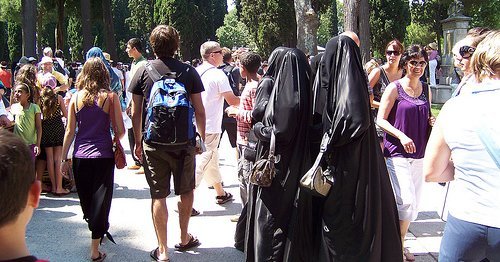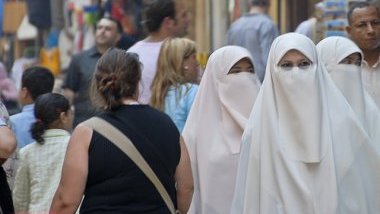For clarity’s sake, it might be interesting to specify that although both pieces of clothing cover the face, the niqab shows nothing but the eyes of the woman wearing it, whereas the burqa covers the entire face. It is also important to state that the law still has to be passed by the Belgian Senate.
“Women are now free from the burden on their shoulders”, says a parliamentarian of the liberal party MR, which introduced the proposal. “This is a very strong signal to extreme Muslims”, another one comments. It is rather unique in Belgium, but this proposal was accepted unanimously, by both majority and opposition parties. “We wanted to take our responsibility towards women in our society.”
This is the hitch though. The proposal itself does not once mention free choice, women’s rights, or even the words “burqa” or “niqab”. On the contrary: the bill is officially entitled “Proposal to prohibit clothing rendering identification of persons in public impossible”. And the motivation for this proposal is formulated in terms of the protection of public safety and national security, which are allegedly endangered by people walking on the street unrecognizably . This way, Belgian parliamentarians wanted to steer clear of the debate which has been held publicly in France, resulting in various protests and manifestations. They also wanted to avoid risks of legal action, which the French Constitutional Court warned about.
None of this in France. After months and months of debates and ado about the bill, the French government decided to propose it to the Chamber of Representatives, which is supposed to vote on it in July. Contrary to the Belgian proposal, the one of its southern neighbors states very obviously that the alleged protection of women’s dignity is the main objective and that the goal is to halt Islamic radicalization. “The dignity of women” is the essence of the French proposal, according to President Sarkozy.
Now, regardless of the discussion whether a burqa is a sign of the oppression of women and an example of religious radicalization, regardless of whether the burqa is a religious or a cultural symbol and regardless of the dilemma between human dignity and freedom of religion, I ask myself the question of whether I feel comfortable living in a country where parliamentarians can vote a proposal which describes one thing, but actually aims at something else. Is it possible in a democracy to formulate laws in a broad sense, but actually target only a few? It is true that the French proposal may lead to stronger protests and legal actions, but perhaps it at least deserves the merit of honesty and transparency. Amnesty International Belgium called the Belgian proposal “a dangerous precedent” and the Council of Europe voted a resolution which condemns burqa-prohibitions based solely on grounds of security. Yet the Belgian Parliament made it very clear that the official motivation of the proposal is national security, but made no secret of the unofficial goal being to ban the burqa.
It is furthermore not irrelevant to take into account the fact that the prevalence of burqas is in reality very low. The day the proposal passed in Belgium, a news crew of the RTBF went on a small research trip looking for women wearing a burqa or niqab. They searched in vain. Although there are, obviously, cases of women wearing burqas and niqabs in Belgium, they are obviously not numerous. The same news crew actually did not even find those pieces of clothing in any shops in Belgium. Some shop owners advised the journalists to check the internet or hesitantly proposed they would look into it, without making any promises.
This is also the opinion of German Interior Minister Thomas de Maizière. Such a small portion of women actually wear a burqa/niqab (he speaks of up to a hundred in the entire country) that, according to him, the debate and the ban is a non-issue, as well as “unnecessary and inappropriate”.
If the burqa is so rare, the question of why targeting a specific religious community and even more specifically a distinct gender of this religion comes to mind.
If the burqa is so rare, the question of why targeting a specific religious community and even more specifically a distinct gender of this religion (whether they are wearing a burqa, a niqab or just a hijab or a chador) comes to mind. And the idea that a restricted focus might do more harm, might not be far off. The main question I ask myself is what the atomic-weapon-against-a-mosquito technique will actually contribute to women and to Belgian society. And if it does not contribute anything in practice, the proposal may very well be nothing more than a populist waste of time and energy as well as an insult. An insult to women who honestly, privately and deliberately exercise their freedom of religion and – due to the secrecy and the legal detour – an insult to those who believe in the values of democracy and the rule of law.



Follow the comments: |
|
